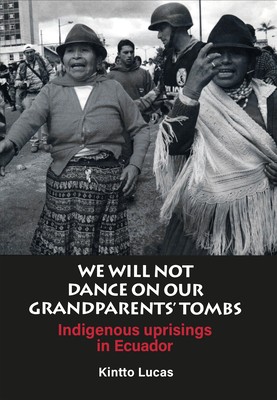
- We will send in 10–14 business days.
- Author: Kintto Lucas
- Publisher: Latin America Bureau (Lab)
- ISBN-10: 1899365494
- ISBN-13: 9781899365494
- Format: 17 x 24.4 x 0.8 cm, minkšti viršeliai
- Language: English
- SAVE -10% with code: EXTRA
Reviews
Description
Although "levantamientos indigenas" (Indian uprisings) have taken place for 500 years, the contemporary indigenous movement in Latin American was signaled by mobilizations in Ecuador, the first in 1990, as resistance to celebrations of the 500th anniversary of Columbus' "discovery" of the Americas. Their slogan then was: "We will not dance on our grandparent's tombs". In 1999 indigenous people ruled Equador, if only for a few hours. In January 2000, the indigenous people of Equador walked into the capital, Quito, where they demanded - and got - the registration of President Jamil Mahuad. This volume contains topical articles covering the "levantamientos" of 1999 and 2000 and interviews with indigenous leaders to provide a unique insight into one of the strongest movements in Latin America. The selection of essays and background information on the problems facing indigenous people make this this a fascinating introduction to Ecuador. The text also covers environmental issues, health and education, political representation, the effect of gentically-modified foods, the patenting of indigenous seeds and the taking of blood samples of indigenous people without their consent. A background and history of indigenous people and black and white photographs are also included.
'We have to be protagonists of change - subjects, not objects'
Miguel Lluco founder member of the Confederation of Indigenous Nations of Ecuador (CONAIE).
'This is not just an Indian struggle but everybody's struggle'
Antonio Vargas, president of CONAIE.
EXTRA 10 % discount with code: EXTRA
The promotion ends in 22d.09:36:00
The discount code is valid when purchasing from 10 €. Discounts do not stack.
- Author: Kintto Lucas
- Publisher: Latin America Bureau (Lab)
- ISBN-10: 1899365494
- ISBN-13: 9781899365494
- Format: 17 x 24.4 x 0.8 cm, minkšti viršeliai
- Language: English English
Although "levantamientos indigenas" (Indian uprisings) have taken place for 500 years, the contemporary indigenous movement in Latin American was signaled by mobilizations in Ecuador, the first in 1990, as resistance to celebrations of the 500th anniversary of Columbus' "discovery" of the Americas. Their slogan then was: "We will not dance on our grandparent's tombs". In 1999 indigenous people ruled Equador, if only for a few hours. In January 2000, the indigenous people of Equador walked into the capital, Quito, where they demanded - and got - the registration of President Jamil Mahuad. This volume contains topical articles covering the "levantamientos" of 1999 and 2000 and interviews with indigenous leaders to provide a unique insight into one of the strongest movements in Latin America. The selection of essays and background information on the problems facing indigenous people make this this a fascinating introduction to Ecuador. The text also covers environmental issues, health and education, political representation, the effect of gentically-modified foods, the patenting of indigenous seeds and the taking of blood samples of indigenous people without their consent. A background and history of indigenous people and black and white photographs are also included.
'We have to be protagonists of change - subjects, not objects'
Miguel Lluco founder member of the Confederation of Indigenous Nations of Ecuador (CONAIE).
'This is not just an Indian struggle but everybody's struggle'
Antonio Vargas, president of CONAIE.


Reviews